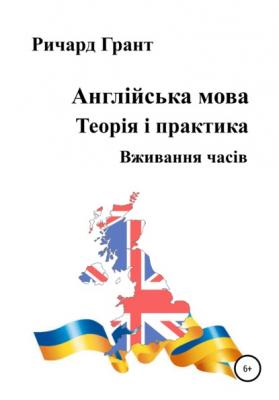Англійська мова. Теорія і практика. Вживання часів. Ричард Грант
Читать онлайн.| Название | Англійська мова. Теорія і практика. Вживання часів |
|---|---|
| Автор произведения | Ричард Грант |
| Жанр | Учебная литература |
| Серия | |
| Издательство | Учебная литература |
| Год выпуска | 2021 |
| isbn | 978-5-532-94578-4 |
They have been hitchhiking for seven years. – Вони подорожують автостопом вже сім років.
Present Perfect – дію завершено. Можна задати питання how much? (скільки?), how many times? (скільки разів?), how often? (як часто?).
I have watched the last episode of “Game of Thrones” three times. – Я подивився останню серію "Гри престолів" три рази.
I have never hitchhiked in my life. – Я ніколи в житті не подорожував автостопом.
Рiзниця мiж The Present Perfect Continuous i The Past Continuous
Present Perfect Continuous – дія почалася в минулому і або все ще триває, або у неї є результат в сьогоденні.
What have you been doing all day today? – I have been working on a presentation for our next meeting. – Чим ти займався весь день сьогодні? – Я працював над презентацією для нашого наступного зібрання.
Past Continuous – дія відбувалася в певний момент в минулому.
What were you doing at 9 p.m. yesterday? – I was working on a presentation for our next meeting. – Що ти робив вчора о 9 годині вечора? – Я працював над презентацією для нашого наступного зібрання.
Рiзниця мiж The Future Perfect Continuous i The Future Perfect Simple
Future Perfect Continuous i Future Perfect Simple схожі, а іноді можуть бути взаємозамінними. Наприклад, у випадку з дієсловами, які не використовуються з часами Continuous: know, understand та іншими. Однак є між ними одна важлива відмінність – для Future Perfect Continuous важливо підкреслити тривалість дії, а Future Perfect Simple робить акцент на завершеності дії і її результаті.
By the end of the day I will have been reading for eight hours. – К кінцю дня я буду читати протягом восьми годин. – Future Perfect Continuous
By the end of the day I will have read 500 pages of the book. – К кінцю дня я прочитаю 500 сторінок книги. – Future Perfect Simple
I will have been working on this project for six months by the end of this year. – К кінцю року я буду працювати над цим проектом вже протягом шести місяців. – Future Perfect Continuous
I will have finished working on this project by the end of this year. – К кінцю року я закінчу працювати над цим проектом. – Future Perfect Simple
Запам'ятайте:
У додаткових реченнях часу і умови після сполучникiв if, when, as soon as, before, till/until, after замість майбутнього часу вживається теперішній час.
Вправа 41
Розкрийте дужки, вживаючи дієслова у Present Continuous, Present Simple або Future Simple.
1. I (to play) chess tomorrow. 2. It (to be) cold in autumn. It often (to rain). A cold wind often (to blow). 3. You (to come) to my place next Sunday? 4. My sister (not to like) coffee. 5. I (not to play) chess tomorrow. 6. The weather (to be) fine today. It (to be) warm, the sun (to shine) brightly. A soft wind (to blow). Small white clouds (to sail) in the sky. 7. You (to read) this book next week? 8. When you (to go) to bed every day? 9. You (to play) chess tomorrow? 10. Don’t go out: it (to rain) heavily. 11. You (to read) books every day? 12. What he (to read) now? 13. He (to play) chess every day. 14. Take your raincoat with you. I am afraid it (to rain) in the evening and you (to get) wet through if you (not to put) it on.
Вправа 42
Розкрийте дужки, вживаючи дієслова у Present Continuous, Present Simple або Future Simple.
1. You (to read) a book now? 2. What he (to read) every day? 3. He (not to play) chess every day. 4. Every spring birds (to come) to our garden and (to sing) in the trees. 5. I (not to see) him tomorrow. 6. What he (to read) tomorrow? 7. He (to play) chess every day? 8. Listen! Somebody (to sing) in the next room. 9. What you (to do) tomorrow? 10. You (to give) me this book tomorrow? 11. They (to play) chess now. 12. It usually (not to snow) at this time of the year. 13. What your friend (to do) tomorrow? 14. Where she (to be) tomorrow?
Вправа 43
Розкрийте дужки, вживаючи дієслова у Present Continuous, Present Simple або Future Simple.
1. They (not to play) chess now. 2. What the weather (to be) like now? It (to snow)? – No, it … . 3. Where you (to go) next summer? 4. Where she (to go) tomorrow? 5. They (to play) chess now? 6. We (to go) out of town to ski on Sunday? – Yes, we … if it (to snow) this week and if there (to be) a lot of snow everywhere. 7. Where you (to go) every morning? 8. She (to go) to the country with us tomorrow? 9. Nick (to walk) in the park now. 10. What you (to do) tomorrow? – We (to go) out of town if the weather (not to change) for the worse. You (to come) with us? – With pleasure, if only I (not to have) too much work to do at home. 11. Where you (to go) now? 12. They (to stay) at home tomorrow. 13. Nick (to go) to school every day.
